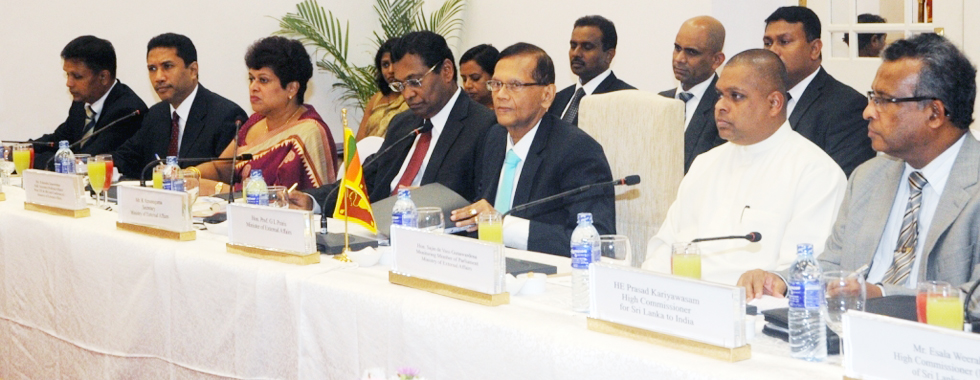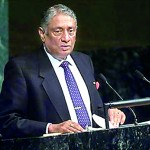Sunday Times 2
Foreign Service fiasco: A crime against the country
Some centuries ago, had a head of State defeated an enemy such as the LTTE and saved a country from being separated, he would have been hailed as the king of the country, for the historic achievement. Our President was re-elected for a second term as a just reward, and Parliament allowed him to change the Constitution to enable him to contest for a third term if he wished to do so.
Parliament also allowed him to arrogate to himself the right to constitute all previously independent State Institutions including the Elections Commission amongst other previously independent Commissions including the Judicial Service Commission. Whatever has happened? The Government was given a virtual ‘blank cheque’ to rule our country. It has undertaken and completed unprecedented infrastructure development in the past ten years but it appears to be dissipating all the goodwill it had acquired. This is indeed sad and should have been avoided. I wish to refer to just one instance to expose the corruption that has set in.
Shocking, unbelievably, stupid and self-defeating were the words that came to the minds of all of us who read the article by senior journalist Namini Wijedasa in the Sunday Times of January 19 titled ‘Foreign Service or Family Service’. We are indebted to her for this brilliant well-researched exposé. It is with regret that I state that our Government, which we need to protect, does not seem to appreciate what ‘international diplomacy’ is about. This Government seems to be dissipating even the little diplomatic capital it has. How else does one explain the appointments it has made to our missions abroad at the country’s expense? It is no doubt a crime against the country and the people of the country — and the people of this country have been made to look ridiculous. They must be made accountable for their actions. This would not have happened anywhere except in a banana republic. These irresponsible appointments have been made only because the appointing authorities do not know the work of a diplomat.
Diplomacy or the ability to practise diplomacy is one of the defining elements of a state; it involves the conduct of international relations through professional diplomats with regard to issues of peace-making, trade, war, economics, culture, environment, and human rights. International treaties are usually negotiated by diplomats prior to endorsement by national politicians. In an informal or social sense, diplomacy, the employment of tact to gain strategic advantage or to find mutually acceptable solutions to a common challenge, one set of tools being the phrasing of statements in a non-confrontational, or polite manner.

Sri Lanka’s External Affairs Ministry delegation led by Minister G.L. Peiris holding talks with a high-level Indian delegation led by External Affairs Minister Salman Khurshid in October last year. Pic courtesy www.mea.gov.lk.
Diplomatic resolution of problems involves arbitration, conferences, negotiations, informal diplomacy, appeasement, soft power, aggression, intimidation often described as Gunboat Diplomacy when persuasion has failed and public diplomacy. What makes our government think that these untrained friends and relatives can perform these functions on our behalf? Is this not a cruel Joke? I am frankly disappointed that our political watchdogs, the so called Opposition, have not protested at this criminal waste of public funds. Today diplomacy has come a long way from the days when Caesar sent his horse to represent him. It is today a respected profession. In the years and centuries that followed diplomacy has acquired a status of its own and has been the instrument to settle international disputes, and is accepted the world over. As stated earlier it is an accepted profession and countries train their diplomats for at least two years in the management of International relations and also spend time at the ministry before being posted out. In today’s globalised world almost every domestic issue has an international dimension to it and the issues are complex and needs the best available talent to deal with the situation. Diplomats were always members of an elitist group greatly respected by the receiving country; today it has come to the level of only according certain privileges and being free of arrest in the discharge of their official duties.
Many years ago, former Civil Servant and Prime Minister’s Secretary D.D. Peiris, Ambassador Manel Abeysekera and self, amongst others, tried to rationalize our overseas administration but nothing came out of it. Have we at least now identified those countries which are most important to us from the point of view of our national interest and are we posting our best to these missions or should there be some other basis on which they have been posted? Should not our Opposition in Parliament be asking these questions and should not our media also be asking these questions in the public interest? Writing of the public interest, should we not be defining what constitutes our national interest; surely, our country’s representatives should be made aware of what constitutes our National Interest
Namini Wijedasa’s article states there is a move to scrap the Foreign Service, this in itself exposes the morons and imbeciles we have as decision makers — almost every country that takes the management of its international relations seriously has not only legislation to protect the Service but a separate institution with university degree awarding status to promote international relations. May I suggest that we invite the directors general of the Malaysian Centre for Strategic and International Studies and the ASEAN Institute and also the head of the Singapore Institute of International Affairs to help us combine the BIDTI and the BCIS and establish a recognised Institute of Diplomacy for countries of SAARC.
I am not here suggesting that the Foreign Service be an entirely closed service. We must draw on the best talent available in the country to serve us. I had myself the great privilege of serving under a truly great diplomat Shirley Amerasinghe, who had the signal honour of being elected to Chair of the famous Law Of the Sea Conference when our country refused to name him even as a mere delegate. I also served under that great orator Neville Kanagaratne and Prof Stanley Kalpage who served as High Commissioner of India during what was perhaps the worst time in the history of our relations with that country when President Premadasa virtually ordered the IPKF to leave Sri Lanka. Prof Kalpage never attended any official meeting without doing his homework – he was always thoroughly prepared, a lesson that has helped me through life.
I had also the privilege of serving with Ambassador Ernest Corea, one time editor of the Daily News. He was the US ambassador during the 1983 July riots, which activated the Tamil Diaspora. He was able to counter them by successfully lobbying the Congress, the White House and also the media without retaining any PR firms at great price. He was also able to have President J.R. Jayewardene invited to the White House on a state visit the following year.
(The writer is a former diplomat)
Kadir’s legacy to Lanka – a highly professionalised Foreign ServiceWe reproduce excerpts from an article written by Sunday Times columnist Thalifdeen on Lakshman Kadirgamar and his contribution towards professionalising Sri Lanka’s Foreign Service. The article appeared in the Sunday Times on August 21, 2005.
 Representing Sri Lanka and its head of state, Lakshman Kadirgamar addresses the UN One of Lakshman Kadirgamar’s greatest contributions was to the country’s Foreign Service which he professionalised as no other foreign minister had. In his last interview at the UN in September 2004, he predicted that Sri Lanka will have a first class Foreign Service in the next 10 to 15 years, as most of the recruits during his tenure wound up as heads of missions overseas. Under his leadership, Sri Lanka opened new embassies in South Africa, Qatar and Jordan and re-opened our mission in the Philippines. He once described Sri Lanka’s Honorary Consul in a Middle Eastern country as “a rogue”. Kadirgamar always admitted that the Foreign Service had a “huge hole” in the middle. “We always picked the cream of the crop,” he said, at a time when the Foreign Ministry picked 14 out of 1,200 applicants. “This is my contribution to the future,” he admitted in one his interviews, pointing out that he will recruitat least five of seven career diplomats every year to fill the gap created by senior officers who had reached the age of retirement. On several occasions, he had trusted the judgement of senior career diplomats when making final decisions. When Sri Lanka was planning to run for a seat in the Security Council (which it later voluntarily conceded to South Korea), Kadirgamar was asked whether Sri Lanka should stand down in favour of another Asian country. He looked at the reporter sitting with him at the UN delegate’s dining room and countered with another question: “What did Nihal tell you”. Kadirgamar was willing to go along with an opinion that was to be expressed by one of our highly rated career diplomats, Nihal Rodrigo, then a minister-counsellor at the Sri Lanka Mission to the UN… Ernest Corea, a former Ambassador to the US and ex-editor of the Daily News and the Observer, agreed that Kadirgamar made a lasting contribution to the Sri Lanka foreign service. “Much has already been said, and more will be written, about his commitment to creating a just and equitable society in Sri Lanka,” Corea said. “An equally important aspect of his legacy is his role of leadership in restoring dignity, professionalism, and self-respect to Sri Lanka’s Foreign Ministry”. Although he had lived and worked abroad, Kadirgamar was a newcomer to managing a country’s foreign relations when he began life as Sri Lanka’s foreign minister, Corea pointed out. “He learned quickly, as he always did. He conducted himself with both confidence and elegance. He was never fazed by the fact that he represented a small country. He won the respect of his peers across the world, as the messages that have poured in to Colombo demonstrate. He did not use his reputation to feed his vanity, but as an instrument to strengthen his country’s cause”. |


